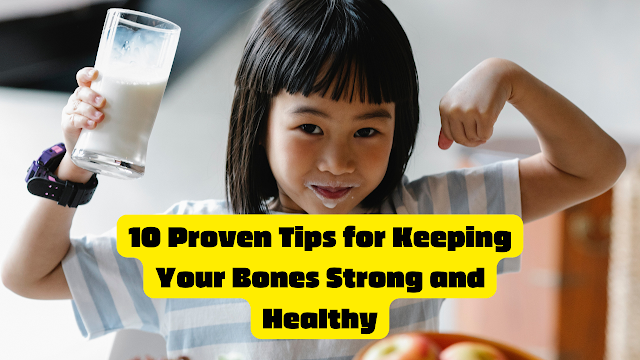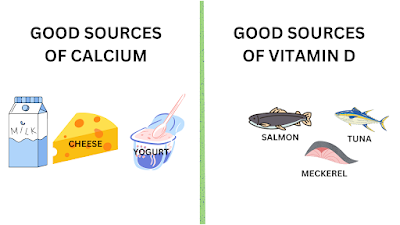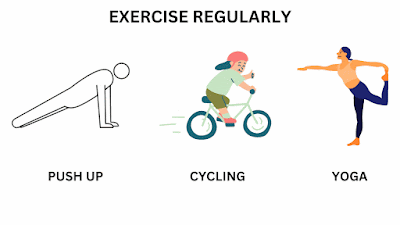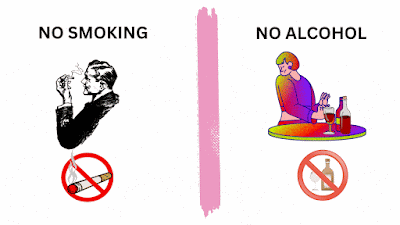The content on this website – including articles, event announcements, personal experiences, and recommendations – is for informational and educational purposes only and is not medical advice. Always consult a qualified healthcare professional before making any changes to your diet, exercise, supplements, sleep habits, or wellness routines, especially if you are pregnant, nursing, on medication, or have any medical condition.
10 Proven Tips for Keeping Your Bones Strong and Healthy
Introduction
Bones play a crucial role in our overall health and well-being. They provide support and structure for our bodies, protect our internal organs, and are essential for movement and physical activity. However, as we age, our bones can become weaker and more susceptible to fractures and injuries. It is essential to take care of our bones and maintain their strength and health to prevent debilitating conditions such as osteoporosis.
In this article, we will cover 10 proven tips for keeping your bones strong and healthy. From incorporating weight-bearing exercises into your daily routine to getting enough calcium and vitamin D, we will discuss practical ways to maintain and improve the health of your bones. We will also explore the importance of maintaining a healthy diet, managing stress, and avoiding smoking and excessive alcohol consumption.
By following these tips, you can help ensure that your bones remain strong and healthy for many years to come.
1. Get Enough Calcium and Vitamin D
• Explanation of the role of calcium and vitamin D in bone health
Calcium and vitamin D are essential for maintaining strong and healthy bones. Calcium is a mineral that makes up the majority of our bones and teeth, while vitamin D helps our bodies absorb and use calcium. Together, they work to ensure that our bones are strong and able to resist fractures and injuries.
• Recommended daily intake of calcium and vitamin D
The recommended daily intake of calcium for adults is 1000mg for men and women up to age 50, and 1200mg for women over 50 and men over 70. For vitamin D, the recommended daily intake is 600-800 international units (IU) for adults.
• Foods rich in calcium and vitamin D
Dairy products such as milk, cheese, and yogurt are excellent sources of calcium, while fatty fish such as salmon, tuna, and mackerel are rich in vitamin D. Other foods that contain calcium include leafy green vegetables, almonds, and fortified cereals and juices. Vitamin D can also be obtained through sunlight exposure, as our body produces it when our skin is exposed to the sun's UV rays.
• Supplements to consider
If you have trouble getting enough calcium and vitamin D through your diet, you may want to consider taking supplements. However, it's essential to talk to your doctor or a healthcare professional before starting any supplement regimen, as excessive intake of vitamin D can be harmful.
In summary, Calcium and Vitamin D are essential for maintaining strong and healthy bones. It is important to get enough of these nutrients through diet and sunlight exposure, and if needed, consult your healthcare professional before taking any supplements.
2. Exercise Regularly
• Explanation of the relationship between exercise and bone health
Exercise is an essential component of maintaining strong and healthy bones. Regular physical activity can help increase bone density, reduce the risk of fractures, and improve overall bone health. This is because when bones are subjected to stress and pressure, they respond by becoming stronger and denser.
• Types of exercise that are beneficial for bone health
Weight-bearing exercises, such as running, jumping, and weightlifting, are particularly beneficial for bone health. They put stress on the bones, encouraging them to adapt and become stronger. Other exercises that are beneficial for bone health include high-impact activities like tennis, basketball and dancing, and resistance training like weightlifting and bodyweight exercises.
• Tips for incorporating exercise into your daily routine
Incorporating exercise into your daily routine doesn't have to be complicated or time-consuming. Even small changes, such as taking the stairs instead of the elevator or going for a walk during lunch, can make a big difference. Experts recommend aiming for at least 30 minutes of moderate-intensity physical activity, such as brisk walking, every day.
One of the best ways to make sure you're getting enough exercise is to find activities you enjoy and make them a regular part of your routine. Whether it's joining a sports team, taking up a hobby or simply going for a walk with friends or family, the key is to find an activity that you'll look forward to doing.
In summary, Regular exercise is an essential component of maintaining strong and healthy bones. Weight-bearing exercises and resistance training are particularly beneficial for bone health. Incorporating exercise into your daily routine by finding activities you enjoy and making them a regular part of your routine can be effective. Consult with a healthcare professional before starting any new exercise routine.
3. Don't Smoke or Excessively Consume Alcohol
• Explanation of the negative effects of smoking and alcohol on bone health
Smoking and excessive alcohol consumption can have a significant negative impact on bone health. Smoking has been linked to a decrease in bone density and an increased risk of fractures, while excessive alcohol consumption can lead to a decrease in the body's ability to absorb calcium and Vitamin D.
Smoking can damage the blood vessels that supply the bones with oxygen and nutrients, leading to bone loss over time. Additionally, smoking can also interfere with the body's ability to produce collagen, a protein that is essential for bone health. Excessive alcohol consumption can also lead to bone loss, as it can interfere with the body's ability to absorb calcium and Vitamin D, and also disrupts the hormonal balance that is needed for maintaining healthy bones.
• Recommendations for reducing or quitting smoking and alcohol consumption
If you smoke, the best thing you can do for your bone health is to quit. If you're struggling to quit, there are many resources available to help you, such as nicotine replacement therapy, counseling, and support groups.
Similarly, if you consume alcohol excessively, it's important to take steps to reduce your alcohol consumption. A moderate amount of alcohol is considered to be one drink per day for women and two drinks per day for men. If you find that you're drinking more than that, consider setting limits for yourself or seeking professional help to reduce your alcohol consumption.
In summary, Smoking and excessive alcohol consumption can have a significant negative impact on bone health. It can lead to a decrease in bone density and an increased risk of fractures. Quitting smoking and reducing excessive alcohol consumption can help maintain healthy bones. There are many resources available to help you quit smoking and reduce alcohol consumption.
4. Maintain a Healthy Body Weight
• Explanation of the relationship between body weight and bone health
Maintaining a healthy body weight is crucial for good bone health. Being overweight or obese can lead to a decrease in bone density and an increased risk of fractures. Being underweight, on the other hand, can also be a problem as it can lead to low bone mass, which can increase the risk of osteoporosis and fractures.
Being overweight or obese can put additional stress on the bones, which can lead to bone loss over time. Additionally, being overweight or obese can also lead to a decrease in levels of estrogen, a hormone that is essential for maintaining healthy bones in women.
• Tips for achieving and maintaining a healthy body weight
Achieving and maintaining a healthy body weight is essential for good bone health. One of the best ways to achieve and maintain a healthy body weight is to eat a balanced diet that is rich in fruits, vegetables, and whole grains. Additionally, regular physical activity is also important to achieve and maintain a healthy body weight. Aim for at least 30 minutes of moderate-intensity physical activity, such as brisk walking, every day.
In summary, Maintaining a healthy body weight is crucial for good bone health. Being overweight or obese can lead to a decrease in bone density and an increased risk of fractures. Being underweight can also lead to low bone mass, which can increase the risk of osteoporosis and fractures. Eating a balanced diet and regular physical activity are essential to achieve and maintain a healthy body weight.
It's also important to consult with a healthcare professional before starting any new diet or exercise routine, especially if you have any pre-existing health conditions.
5. Get Enough Sleep
• Explanation of the relationship between sleep and bone health
Getting enough sleep is important for maintaining good bone health. Sleep plays a crucial role in the body's ability to repair and rebuild bones. During sleep, the body releases growth hormone and other hormones that are essential for maintaining healthy bones.
Lack of sleep can lead to a decrease in bone density and an increased risk of fractures. Studies have shown that individuals who have difficulty sleeping or who do not get enough sleep have a higher risk of osteoporosis and other bone-related conditions.
• Tips for getting a good night's sleep
To get a good night's sleep, it's important to establish a regular sleep routine. This means going to bed and waking up at the same time every day, even on weekends. Avoid caffeine, nicotine, and alcohol close to bedtime as they can interfere with sleep. Also, try to relax before bed, such as by reading a book or listening to soothing music.
It's also important to create a comfortable sleep environment. This means keeping the bedroom dark, quiet, and at a comfortable temperature. Make sure your mattress and pillows are comfortable and supportive.
In summary, Getting enough sleep is important for maintaining good bone health. Sleep plays a crucial role in the body's ability to repair and rebuild bones. Lack of sleep can lead to a decrease in bone density and an increased risk of fractures.
To get a good night's sleep, it's important to establish a regular sleep routine, avoid caffeine, nicotine, and alcohol close to bedtime, relax before bed, and create a comfortable sleep environment.
6. Minimize caffeine intake
• Explanation of the relationship between caffeine and bone health
Caffeine is a stimulant that can be found in many foods and drinks, including coffee, tea, chocolate, and some medications. While moderate caffeine intake may not have a significant impact on bone health, excessive caffeine intake can lead to a decrease in bone density and an increased risk of fractures.
Caffeine can interfere with the body's ability to absorb calcium, a mineral that is essential for maintaining healthy bones. Additionally, caffeine can also lead to an increase in the amount of calcium excreted in the urine. This can lead to a decrease in bone density over time.
• Tips for minimizing caffeine intake
To minimize caffeine intake, it's important to be aware of the sources of caffeine in your diet. This includes coffee, tea, chocolate, and some medications. Try to limit your intake of these foods and drinks and consider switching to decaffeinated versions. Additionally, be aware of the caffeine content of any medications you are taking.
It's also important to note that some individuals may be more sensitive to the effects of caffeine than others. If you are experiencing symptoms such as anxiety, insomnia, or palpitations, it may be a good idea to reduce your caffeine intake.
In summary, Caffeine is a stimulant that can be found in many foods and drinks, including coffee, tea, chocolate, and some medications. Excessive caffeine intake can lead to a decrease in bone density and an increased risk of fractures. To minimize caffeine intake, be aware of the sources of caffeine in your diet, try to limit your intake of these foods and drinks, and consider switching to decaffeinated versions. Be aware of the caffeine content of any medications you are taking. If you are experiencing symptoms such as anxiety, insomnia, or palpitations, it may be a good idea to reduce your caffeine intake.
7. Avoid Crash Dieting and Eating Disorders
• Explanation of the negative effects of crash dieting and eating disorders on bone health
Crash dieting and eating disorders can have negative effects on bone health. Crash dieting, also known as restrictive dieting, is characterized by sudden, drastic reductions in calorie intake. This can lead to a decrease in bone density and an increased risk of fractures. Eating disorders, such as anorexia and bulimia, also have a detrimental effect on bone health. They can cause a reduction in bone density and an increased risk of fractures.
The body needs a variety of nutrients, including calcium and vitamin D, to maintain healthy bones. Crash dieting and eating disorders can cause a deficiency in these important nutrients, leading to decreased bone density. Additionally, these conditions can also lead to a decrease in muscle mass, which can further increase the risk of fractures.
• Tips for maintaining a healthy diet
To maintain a healthy diet, it's important to eat a balanced diet that includes a variety of nutrient-rich foods. This includes foods that are high in calcium, such as dairy products, leafy greens, and fortified foods. Vitamin D can be found in fatty fish, egg yolks, and fortified foods.
It's also important to consult with a registered dietitian or healthcare professional before making any drastic changes to your diet. Crash dieting and eating disorders can be harmful to your health, and it's important to seek professional help if you suspect you may have an eating disorder.
In summary, Crash dieting and eating disorders can have negative effects on bone health. Crash dieting is characterized by sudden, drastic reductions in calorie intake, which can lead to a decrease in bone density and an increased risk of fractures. Eating disorders, such as anorexia and bulimia, also have a detrimental effect on bone health.
To maintain a healthy diet, it's important to eat a balanced diet that includes a variety of nutrient-rich foods, such as foods that are high in calcium, vitamin D, and other important nutrients.
It's also important to consult with a registered dietitian or healthcare professional before making any drastic changes to your diet. Crash dieting and eating disorders can be harmful to your health, and it's important to seek professional help if you suspect you may have an eating disorder.
8. Take Medications as Prescribed
• Explanation of the relationship between certain medications and bone health
Certain medications can have an impact on bone health, and it's important to take them as prescribed to minimize any negative effects. For example, long-term use of glucocorticoid medications, such as prednisone, can lead to a decrease in bone density and an increased risk of fractures. Similarly, anticonvulsant medications, such as phenytoin and phenobarbital, can also affect bone health.
• Tips for taking medications as prescribed
To minimize the negative effects of these medications on bone health, it's important to take them as prescribed. This includes taking the medication at the right time, in the right dose, and for the duration of time recommended by your healthcare provider.
It's also important to discuss any concerns about the potential effects of a medication on your bone health with your healthcare provider. They may be able to adjust the dosage or switch you to a different medication that has less of an impact on bone health.
In addition, it's also important to maintain a healthy lifestyle and engage in bone-healthy behaviors, such as getting enough calcium and vitamin D, exercising regularly, and maintaining a healthy body weight. These behaviors can help to minimize the negative effects of certain medications on bone health.
In summary, certain medications can have an impact on bonehealth, and it's important to take them as prescribed to minimize any negative effects. Some examples of these medications are glucocorticoid medications, such as prednisone, anticonvulsant medications, such as phenytoin and phenobarbital.
To minimize the negative effects, it's important to take the medication at the right time, in the right dose, and for the duration of time recommended by your healthcare provider. Consult with your healthcare provider if you have any concerns about the potential effects of a medication on your bone health.
9. Avoid Exposure to Environmental Toxins
• Explanation of the negative effects of environmental toxins on bone health
Exposure to environmental toxins can have negative effects on bone health. These toxins can include heavy metals, such as lead and mercury, as well as pesticides and other chemicals.
Research has shown that exposure to lead, for example, can lead to a decrease in bone density and an increased risk of fractures. Similarly, exposure to pesticides and other chemicals has been linked to an increased risk of bone fractures.
• Tips for minimizing exposure to environmental toxins
To minimize exposure to environmental toxins, it's important to be aware of the potential sources of these toxins and take steps to avoid them. Some tips for minimizing exposure to environmental toxins include:
- Eating organic produce, as this can reduce exposure to pesticides
- Using a water filter to remove heavy metals and other toxins from your drinking water
- Being mindful of the cleaning and personal care products you use, and choosing products that are free of harmful chemicals
- Taking steps to limit your exposure to lead, such as by testing your home for lead paint and having your children tested for lead exposure
- Avoiding smoking or excessive alcohol consumption
It's also important to be aware of the potential risks associated with certain hobbies or jobs that may expose you to environmental toxins, such as working in a factory or with certain chemicals.
In summary, exposure to environmental toxins can have negative effects on bone health. Examples of these toxins are heavy metals, such as lead and mercury, as well as pesticides and other chemicals. To minimize exposure to environmental toxins, it's important to be aware of the potential sources of these toxins and take steps to avoid them.
10. Consult with a Healthcare Professional
• Explanation of the importance of consulting with a healthcare professional for bone health
Consulting with a healthcare professional is an important step in maintaining good bone health. A healthcare professional can help you identify any risk factors for bone loss, such as a family history of osteoporosis, and develop a plan to help you maintain strong bones. They can also help you understand the potential side effects of any medications you're taking and make adjustments if necessary.
It's especially important to consult with a healthcare professional as you get older, as the risk of osteoporosis and other bone-related conditions increases with age. Women are at particularly high risk of osteoporosis, so it's important for women to discuss bone health with their healthcare provider.
• Tips for finding a healthcare professional
When looking for a healthcare professional, it's important to find someone who has experience and expertise in bone health. This may include a primary care physician, a geriatrician, an endocrinologist, or a rheumatologist.
Here are some tips for finding a healthcare professional for bone health:
- Ask for recommendations from family and friends
- Check with your insurance provider for a list of in-network providers
- Use online directories to find healthcare professionals in your area
- Check with professional organizations such as the American College of Rheumatology or the National Osteoporosis Foundation for a list of specialists in your area
- If you have a specific condition such as osteoporosis, ask for a referral to a specialist
In summary, consulting with a healthcare professional is an important step in maintaining good bone health. A healthcare professional can help you identify any risk factors for bone loss and develop a plan to help you maintain strong bones. It's especially important to consult with a healthcare professional as you get older, as the risk of osteoporosis and other bone-related conditions increases with age.
When looking for a healthcare professional, it's important to find someone who has experience and expertise in bone health. You can find a healthcare professional by asking for recommendations from family and friends, checking with your insurance provider, using online directories, or checking with professional organizations.
Most Recommended Program:
Conclusion
• Summary of the tips covered in the article
In conclusion, maintaining strong and healthy bones is vital for overall health and well-being. The tips outlined in this article can help you achieve and maintain good bone health. These tips include getting enough calcium and vitamin D, exercising regularly, not smoking or excessively consuming alcohol, maintaining a healthy body weight, getting enough sleep, minimizing caffeine intake, avoiding crash dieting and eating disorders, taking medications as prescribed, avoiding exposure to environmental toxins, and consulting with a healthcare professional.
• Final recommendations for maintaining strong and healthy bones
By following these tips, you can help keep your bones strong and healthy throughout your life. Remember to consult with a healthcare professional to determine your risk of bone loss and to develop a plan that is tailored to your specific needs. Additionally, be sure to get enough calcium and vitamin D, exercise regularly, maintain a healthy body weight, and get enough sleep, in order to help maintain strong and healthy bones.
Maintaining strong and healthy bones is vital for overall health and well-being, and following these tips can help you achieve and maintain good bone health. By taking care of your bones, you can help keep your bones strong and healthy throughout your life.
General FAQ & Answers: 10 Proven Tips for Keeping Your Bones Strong and Healthy
A. Weight-bearing exercises, such as walking, running, jumping, stair climbing, weightlifting, and dancing, are best for maintaining healthy bones. These types of exercises help to increase bone density and reduce the risk of osteoporosis.
Q. How
much calcium and vitamin D do I need for good bone health?
A.The recommended daily intake of calcium for adults is 1000 mg for men and women up to age 50 and 1200 mg for women over 50 and men over 70. For vitamin D, the recommended daily intake is 600-800 international units (IU) for adults.
Q. Can
smoking and alcohol consumption affect my bone health?
A.Yes, smoking and excessive alcohol consumption can negatively impact bone health. Smoking can decrease bone density and increase the risk of fractures, while excessive alcohol consumption can also decrease bone density and increase the risk of fractures.
Q. Is it
possible to improve bone health as I age?
A. Yes, it is possible to improve bone health as you age. Eating a diet rich in calcium and vitamin D, exercising regularly, and avoiding smoking and excessive alcohol consumption can all help to improve bone health.
Q. How
can I tell if I have a bone density issue?
A. A bone density test, also known as a DEXA scan, can be used to measure bone density. Your healthcare professional may also ask you about your symptoms and conduct a physical exam, and may also order blood tests to check your levels of calcium and vitamin D.
Q. Are
there any foods that I should avoid in order to maintain healthy bones?
A. Too much of foods high in sodium and caffeine
may have negative effects on bone health. Consuming high levels of animal
protein may also increase the risk of bone loss, so it's important to consume a
balanced diet.
Q. Are there any supplements I can take to help with my bone health?
A. Calcium and vitamin D supplements are commonly recommended for bone health. However, it's always best to talk to your healthcare professional before taking any supplements to make sure they are appropriate for you.
Q. Can lack of sleep affect my bone density?
A. Yes, lack of sleep can affect bone density. Research has shown that people who sleep less than 7 hours a night have lower bone density than those who sleep more. Additionally, poor sleep quality has been linked to lower bone density and an increased risk of osteoporosis.
Q. When
should I see a doctor about my bone health?
A. It is recommended to see a doctor about your bone health if you have risk factors for osteoporosis, such as being postmenopausal, having a family history of the condition, or if you have broken a bone after a minor fall. Additionally, if you have any symptoms such as unexplained bone pain, back pain, or loss of height, it is important to consult with a healthcare professional. It is also important for individuals over the age of 50 to have regular bone density screenings as part of their preventative health care.

.png)














.png)

.png)
